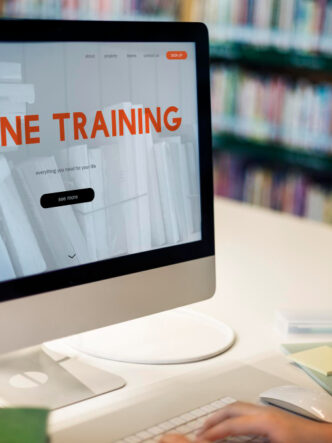Video is an important communication medium if you publish online courses or content.

Online courses and content publishers use videos extensively to provide content externally but also use video content to communicate internally within an organization. The information organizations share with employees or that colleagues share with one another may be confidential and not for public consumption.
How can you ensure that your videos are secure if they contain confidential and sensitive data?
Secure video hosting can ensure that only authorized viewers can access your content. It can also spare your online course/publishers website a lot of resources and give you powerful ways to put your videos to good use.
Significance of secure video hosting to grow your organization

More video content you create, greater a need for a secure video hosting platform.
Most free video hosting platforms offer certain privacy options, but it is still easy for cybercriminals to use sophisticated tools to circumvent these. Even if you’re not concerned about data theft, you need to comply with data privacy regulations so viewers know their information is secure.
Good private video hosting platforms not only offer more security but comply with data privacy regulations.
If anyone can download and use your online course videos, it would compromise your intellectual property rights. Compromised videos often contain useful information like metadata that hackers can use. Screengrabs of the video assets may offer hints about your business structure and the software you use.
A secure video hosting solution ensures that your videos are only seen by the people to whom you give permission.
Ensuring that video content is secure helps you to scale without fearing any data loss or security issues.
Online courses and publishers can grow their user base and revenue by ensuring that the video content you produced is being used rightfully and by maintaining control over your organizational revenue streams.
Check on these factors if you’re considering private video hosting
Private video hosting platforms vary in a number of areas such as video security, analytics and hosting prices. The right video host for your organization will have a flexible balance between these factors that offer the most value for you.
Here are some of the questions you need to ask your video service provider about private video hosting:
- Can I customize the video player?
- Will I have consistency and seamless playback no matter where I choose to distribute my videos?
- Will people watching from any device be able to access my video content?
- Will people in any location have access to video content?
- Can I track who my video content is reaching and where?
- Can I see how prospects engage with my videos and when they are most or least engaged?
- Are there ways I can manage my videos so it is easy to find them?
- What security measures are available so I can prevent unauthorized access to my videos?
Features you need for secure video hosting

Private video hosting platforms offer a vast range of features. Some of the must-have features include the following ones.
A customizable video player

Customize your Video Player with Cincopa
When a video player is customizable, you can add your own logo or watermark to it so it harmonizes with your brand style.
This gives online courses maximum brand exposure wherever people watch their videos. You may also be able to customize player controls and behavior and add or remove specific buttons.
YouTube and other free video hosting sites only give you limited customization options for your video channels and players. You can not fully remove YouTube branding from a player and everyone can see that your videos are being hosted on YouTube which isn’t always desirable.
Hence a customizable video player to ‘white-label’ your video should be a publishers priority. Customizing your video player helps a viewer to focus on the brand message, leading to an instantaneous brand recall.
Reliable video delivery on all devices
Online education platform want to know that no matter where people view a video and from which device they do so, the videos will load quickly and look good. Online courses should get a reliable video delivery on all devices with a fully responsive layout.
Private video hosting solutions have the technology to ensure many people can watch your videos simultaneously from any device and have a great experience. A video content delivery network (CDN) consists of a group of widely distributed networks (pops) that speeds up web content delivery by bringing it closer to users. Streaming occurs from whichever server pop is closest to the device of each viewer which means no lagging or crashing of video on the website or platform.
Easy-to-use video content management system
When a content management system isn’t easy to use, certain tasks can take hours instead of minutes.
An intuitive design and the ability to organize videos into folders and subfolders can make many things, including security compliance, much easier. With digital asset management (DAM) it is possible.
For example, content managers can easily assign and track permissions or make security changes to many videos at the same time. You should be able to view, organize, edit and analyze the videos from a dashboard. It should be easy to copy, duplicate and download video content.
A searchable video content management system like DAM makes video content easier for the right people to find.
Comprehensive copyright and data protection
A secure video platform gives online course platform complete control over their video content. Education platforms can make their videos public or private depending on the access decided for the users.
A feature like domain lock can ensure that your video content appears only on specific websites. Geographic and domain restrictions can protect content from being accessed outside of certain white-listed zones.
Password-protecting videos restricts unauthorized users from accessing videos. Single sign-on (SSO) ID management means that employees can log on by using the same credentials they already use at work to view videos. This reduces the losses that can occur due to weak or missing passwords by asking for another layer of authentication without which access is denied. Restricting access to user roles and permissions also ensures more data security.
GDPR-compliance means that European businesses and businesses that serve European users can safely rely on a secure video host to host their videos.
Real-time video analytics covering key metrics
Free video hosting platforms offer some analytics but these are basic and don’t give you the level of insight you need to inform your marketing decisions.

Cincopa offers Video Analytics and Video Heatmaps
Online education platform will want access to detailed analytics of their videos to find out more about their audience. Video analytics will help you to find out who watches the videos and lets platforms view specific data like audiences location, IP addresses, viewing times, average engagement, and devices they use. Some platforms offer video heatmaps so you can see how engagement changes while they view.
Video analytics shows you what content works and can be instrumental in helping your video platform grow exponentially.
Integrations with your existing tools and systems
Integrations with your existing tools and systems can be very helpful.
For instance, online courses can integrate their learning management system (LMS) with a video hosting platform to offer a high-quality video learning experience.
With a video hosting solution, online education platforms can integrate their email management system (EMS) or customer relations management solution (CRM) to create more comprehensive marketing campaigns. Online course can incorporate videos into their emails for prospecting, follow-ups, referrals and more.
Easy ways to embed videos into websites
You should have the ability to embed your videos on any web page just by copying and pasting the code. Different methods for embedding may be necessary and if SEO tags are included in the embed code, it can boost your videos in the search results.
Why online course creators should secure videos
Visual learning often makes it easier to learn than reading text so videos form an integral part of any online course.
If you have an online course platform, issues like branding, analytics, security and support are all very important to your success.
Online course need a very secure video platform to make sure that their intellectual property is protected and does not get into the wrong hands.
If educational platforms don’t take the right security measures, there is a risk that the course material could be stolen or accessed by unauthorized users.
There is also a great risk of someone downloading your online course materials and redistributing them elsewhere if you host your video course on YouTube.
YouTube can not be matched with the wide reach it offers but it is not a good option for premium course content. If you want people to pay to access your course content and you don’t want other people to access it without paying, utilizing services of a videos hosting solution like Cincopa is the best option.
Why content publishers should secure videos
Piracy of copyrighted materials has become a danger to creative content creators. If you’re a content publisher and you don’t protect your videos, your content may be used as part of someone else’s product.
Companies also don’t want their internal video communication to be downloaded and shared with people all over the internet.
When someone clicks on a video, you want the person to go straight to your website. If online course don’t protect their videos, it could end up driving traffic to other websites or to their competition. Video hosting platforms helps you secure your videos, so that someone else cannot embeds your video and take your traffic and conversions.
There are several ways to ensure that only authorized viewers can access your videos. For instance, by using right-click protection, you can prevent unwanted video downloading by hiding the original source code.
Password protection and domain locking, as mentioned previously, are other ways to block your video content from unwanted views so you can monetize it. Domain lock allows you to create a specified list of domains where embedding of your content is allowed.
You can use your video security as a marketing advantage as you can maintain a level of freedom and access for rightful users. When content remains exclusive, it increases its impact whereas letting it get out can dilute its effectiveness.
Benefits of private video hosting for online courses
Private video hosting offers a number of benefits that free hosts do not, from the use of effective marketing tools to better security and more tech support.
Actionable analytics and superior security are two of the most important benefits. Online courses need to separate their video content from all the distractions found on free platforms if you want to showcase its quality.
Copyright violations occur if the video contents of your course are re-used or repurpose elsewhere for profit without your consent or knowledge. These violations can cause online course platforms to lose revenue and create a lack of trust in the company.
Managing and organizing all your video content as an asset is not easy unless you use a private video hosting platform. Private video hosting platforms allow you to batch upload videos and tag them for better organization. Sorting and searching of videos is easier with tags and titles offered with a digital asset management solution, and you can even create video media libraries and playlists.
Online courses can add accessibility options to videos and get robust analytics. Online course platform can create live broadcasts with chat and much more.
IP addresses are usually limited to a specific network and online courses can restrict IP addresses to make sure people seeing your videos are watching them from a specific location. This is a way to ensure that internal training videos aren’t leaked outside of a company or college campus.
When you effectively secure your video content, you can ensure that access to your premium and exclusive content is restricted to those who are rightfully allowed to see it, whether this is a client, a verified user, or a team member.
DRM encryption and Digital Rights Management (DRM)
Video encryption
Video encryption masks and secures your video through codes and passwords to keep it safe. It protects the content from being intercepted by third parties or watched by unwanted viewers while also making it available to legal users by decoding it for them.
DRM encryption
DRM technology is what you can rely on as a provider of an online course or digital content to build a successful business and earn revenue for your hard work.
You can ensure that if your video course is copied to another device or accessed outside of an authorized location, it can’t be opened. The user has to request a key from the license server to play the video. A decryption key is only issued when the user and device are authorized. The player can then decrypt and play back the content.
Real-time messaging protocol encryption (RTMPE)
Some more advanced video hosting platforms offer an option called RTMPE or real-time messaging protocol encryption, whereby video content is divided into pieces for delivering and playing when required, making it nearly impossible to steal a whole video.
Secure video streaming
It is possible to secure video streaming during live broadcasts to make sure that no third parties have access to exclusive content. Content is encoded in the CMS and decoded for specific users.
Digital Rights Management (DRM Protected)
Digital Rights Management or DRM Protected can bolster the overall protection of your video assets.
Online video platforms bind encryption keys with a set of conditions that must be met as to how and when to use the keys to access and view the video assets.
Keys, like any digital information, can be copied and shared so encryption alone is not enough to protect content. Keys need to be bundled with a digital license and DRM protection containing rules about content usage.
A variety of usage policies can be created with digital rights management (DRM). For example, a license may include rules for time-based usage that means access to a course expires on a specific date. The flexibility of the rules means you can tailor user experience through a digital rights management system.
Stop screen recording
Another way people can copy your video content is use a video screen capture tool. Students may even unknowingly record a screen during a presentation and then distribute it on other platforms.
If you protect your video with a watermark or your logo, someone may be able to capture a screen but they can’t use it commercially, and all viewers who see it will associate it with your business.
A dynamic watermark gives you complete control of a watermark and you can show your company’s name and the person who is playing the video which helps you find users who record your videos illegally. The position of the watermark changes at times while the video is playing so it provides an extra layer of authentication than a static watermark. It is almost impossible to remove from content.
The bottom line
When you use free video hosting sites, you don’t have full control over the content you share. If you want to avoid unauthorized usage of your videos and ensure that only people you grant permission can see them, you should use a private video hosting platform. Using a private video hosting platform offers many benefits, including effective ways to secure your video content both on your own website and in external sources.
As a publisher of online courses or content, you have to limit watching to your paid clients or you risk losing some of your income. Security features do more than just protect your video content – they increase your market strength and protect your content so you can monetize it.










